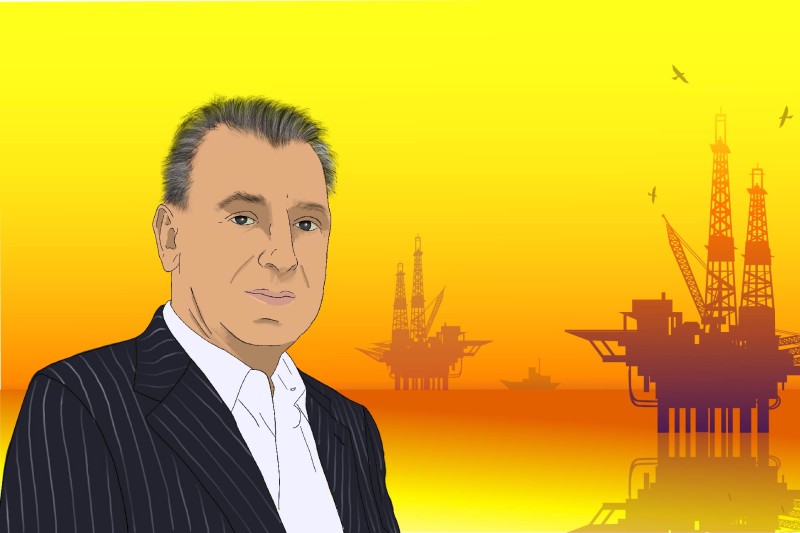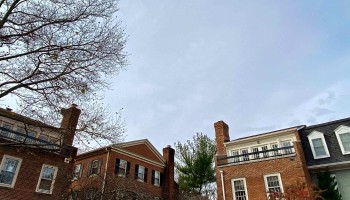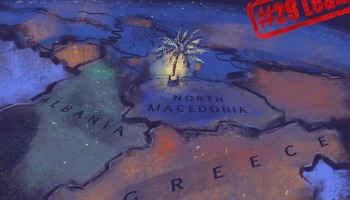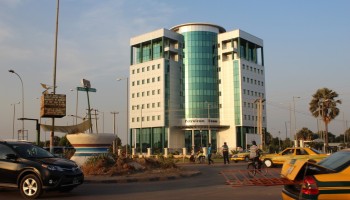A Romanian-Australian businessman with a history of fraud, corruption, and misleading investors appears to have received at least $650 million from a West African oil and gas deal carried out with the help of well-positioned relatives of two consecutive Senegalese presidents.
The sweetheart deal cost Senegal hundreds of millions of dollars in rights to the oil and gas concession, as well as billions in royalties from oil and gas production.
The transaction was another chapter in the colorful, decades-long career of Vasile Frank Timis, 55, who went from being twice-convicted for possessing heroin with intent to distribute to earning a fortune in mining and petrochemical exploration deals — many in poorly governed and impoverished countries.
Controversy has followed Timis since he left Romania as a teen, moved to Australia and earned billions in mining while his companies were being fined and sanctioned by stock exchanges for deceiving investors and making fraudulent claims. Seldom if ever did his pre-African ventures involve much actual mining.
In Senegal, Timis fostered relationships with close family members of two sitting presidents and gained access to the country’s oil reserves under extremely favorable conditions. Within a couple of years, he flipped the investments, selling the offshore blocks for hundreds of millions of dollars from 2014 onwards to U.K. oil giant BP and its U.S. partner, Kosmos Energy.
A cache of documents obtained exclusively by OCCRP reveal serious irregularities, and potential illegal conduct, related to the two deals. The documents include company files, financial records, and interviews by Senegalese investigators. Documents obtained by the BBC show that Timis also stood to gain billions in royalties from BP.
The records held by OCCRP show that:
In January 2012, a Timis-linked Cayman Island company, Petro-Tim Ltd., gained control of two major Senegalese offshore oil blocks worth billions of dollars through Energy Minister Karim Wade, son of the country’s then-President Abdoulaye Wade. Karim Wade awarded the blocks to Petro-Tim even though the company had not yet been established when the deal was made.
In July 2014, Timis Corp., a British Virgin Islands-registered company owned by Timis, acquired the rights to both offshore oil blocks. Less than two months later, Timis Corp. sold 60 percent of the shares to Kosmos, which would become the U.S.-based BP partner.
Timis’ initial US$5 million investment in the project came mostly through opaque transactions within his own group of companies. The stake was later divided between a sale to Kosmos in 2014 for over $400 million and another to BP in 2017 for more than $200 million, plus royalty rights.
At the same time Timis was carrying out his deal with Kosmos, he gave a lucrative position in his company, Timis Corp., to Aliou Sall, the brother of Senegal’s current president, Macky Sall. The managing director job, which appeared to carry few responsibilities, paid an annual salary of about $260,000.
Although U.S.-based Kosmos may not have been involved in any corruption, the acquisition of oil blocks at a steep discount and the later sale coinciding with an arrangement that benefitted the president’s brother together raise questions about whether the deal was structured to bypass the U.S. Foreign Corrupt Practices Act. The law bars companies from obtaining influence by compensating public officials or providing their relatives and close associates with “value” that could influence them.
Professor Matthew Stephenson, who teaches law at Harvard University, told OCCRP “the circumstantial evidence was very strong” that the subsidiary’s employment of the president’s brother was intended to improperly influence the president.
Stephenson said that there would only be an FCPA violation if the companies involved had a U.S. connection, such as a listing shares on a U.S. securities exchange "and if offering the job to the president’s brother was intended as a benefit to the president himself.”
Timis didn’t respond to messages sent to his email address, his businesses and his trust company, Trident, that oversees his offshore holding company, Sarella. In response to a BBC story about the deals in Senegal, he did issue a statement saying: "These allegations are entirely false. There has been no wrongdoing whatsoever in relation to the Saint-Louis Offshore Profond and Caya Offshore Profond oil and gas concessions."
An Offshore Bonanza
Timis’ business moves in Senegal were a bold play for a piece of one of Africa’s greatest remaining natural resources: the Greater Tortue oil and gas complex. The sprawling reserves in the Atlantic Ocean off Senegal and Mauritania are estimated to contain as much as 50 trillion cubic feet of natural gas and a billion barrels of oil. The fields comprised perhaps the largest hydrocarbon discovery in 2017.

On Jan. 17, 2012, then-Senegalese Energy Minister Karim Wade made the decision to grant development rights for the Greater Tortue drilling areas of Saint Louis and Cayar to Petro-Tim. The deal came in the final months of Abdoulaye Wade’s presidential term, and was a surprise to officials at Senegal’s state oil and gas agency, Petrosen, who had been deep in negotiations with another company to take over those drilling areas.
Wade then ushered Petro-Tim through a normally arduous, often lengthy approval process in a matter of days, discarding negotiations for the oil blocks between Petrosen and a much larger U.K. company, Tullow Oil.
Several Petrosen officials, including then-CEO Ibrahima Mbodji told anti-corruption investigators that Wade had demanded absolute discretion and the “best contract terms” for Petro-Tim.
Petrosen legal adviser Ndieye Aissatou Sy echoed this assessment, telling the investigators in 2016 that Mbodji “asked us to treat the file with full confidentiality. The best terms were offered afterwards.”
Hardly anyone at Petrosen had heard of Petro-Tim. Director General Mamadou Faye told investigators that “at no time was there any negotiations with a company called Petro-Tim.”
One reason agency officials may not have heard of the enterprise was that Petro-Tim didn’t yet exist.
The deal gave Petro-Tim 90 percent of the blocks for exploration and potential drilling; the remaining 10 percent stayed in government hands.
The strict secrecy of the Cayman Islands means reporters were unable to find out who legally owned Petro-Tim at that time. However, subsequent events revealed the company was acting in the interest of Timis and his partners.
Even after Wade approved the Petro-Tim contracts, Petrosen, the state-owned oil and gas company, continued to negotiate with Tullow Oil.
Petrosen appears to have deliberately misled Tullow by not informing it of the Petro-Tim deal until after Tullow paid bonus fees, even though such fees are not required by Senegal’s Petroleum Code.
After the Petro-Tim deal, Tullow allegedly made payments into Petrosen’s accounts for what the British company’s officials characterized as money for another unrelated oil block, but which Petrosen CEO Mbodji described as “bonus” payments for Saint Louis and Cayar rights.
Mbodji asked Tullow to pay $1.5 million per block in bonuses for the two concession licenses. Mbodji testified that Tullow paid $3 million in bonus fees to an overseas French bank account. The purpose of the payments remains unclear.
It is also unclear what, if anything, Wade gained from helping Petro-Tim.
Ousmane Sonko, a former senior tax official and parliamentarian turned presidential candidate in Senegal, said during the National Anti-Corruption and Fraud Office hearing that corruption in awarding oil field contracts cost the country at least 90 billion West Africa CFA francs ($155 million).
The loss hits hard in a country in which 75 percent of families live in chronic poverty, according to the U.N.’s World Food Programme, and where the economy remains heavily focused on agriculture, including subsistence farming.
Fatima, a cook and cleaner with five children who earns about US$30 a month in the coastal city of Popenguine, said Senegal needs to use its natural resources to improve the lives of ordinary citizens like her and her family. Many in the area like Fatima are afraid to give their full names for fear of reprisals from the government or military.
"We do not vote for this President Sall or that one, Wade. They are all the same,” she said. “Our government is not killing us with guns, but with poverty.”
She said she hopes the government will do more with its natural resources in the future. Oil production from the Greater Tortue blocks is expected to start in 2020.
"We could have something to help our lives become better, like good clinics and good cheap food. This is all that matters. Eating good and keeping your health and your safety. It would make our lives better?"
A New Political Link
In April 2012, just months after Petro-Tim gained access to the Cayar and Saint Louis oil and gas blocks, Macky Sall replaced Abdoulaye Wade as Senegal’s president.
By June, President Sall had confirmed Petro-Tim’s contract for both offshore drilling areas. A month later, on July 9, the company established a local subsidiary, Petro-Tim Senegal. Its managing director was Aliou Sall, the new president’s younger brother.
Aliou Sall’s duties were vague. Asked about his role, he repeatedly told investigators in 2016 that he was a “consultant.” For this, he said he earned around $22,000 per month. The average monthly wage in Senegal in 2018 was about $150.
Cash withdrawals from Petro-Tim’s account, recorded in financial documents reviewed by OCCRP, show about $450,000 paid out for undisclosed purposes in 2014 alone.
Documents filed with Senegal’s business registry don’t show who owned the Petro-Tim subsidiary, but Aliou Sall told Senegalese investigators that it was a partnership between Timis and Petro-Tim director Wong Joon Kwang (also known as Eddie Wong).
Some of Petro-Tim’s local employees had previously worked with Timis. Director James Smith also served as a director at African Petroleum, an Oslo-listed oil company that Timis once owned and in which he was a shareholder. The company operates in Senegal and Gambia, where both governments are suing the company for stalling oil production. In Gambia, Timis paid millions of dollars in bonuses that disappeared into the pockets of former dictator Yahya Jammeh and his associates.
The new subsidiary, Petro Tim Senegal, for which the president’s brother consulted, appeared to have done very little work at the time, according to the documents.
From One Company to the Next
On July 3, 2014, Petro-Tim transferred its entire stake in the Senegalese offshore oil and gas blocks to Timis Corp. In exchange, Timis Corp. wrote off $3.2 million in debt Petro-Tim allegedly owed it. Less than two months after the company bought the shares, the blocks were sold to Kosmos.
This allowed Timis to pocket the profits via his role as Timis Corp.’s owner in a deal that may have effectively circumvented the FCPA laws.
The deal worked like this:
Between 2012 and 2014, Timis acquired a 10 percent stake in a company called Petro Asia, which was the parent of Petro-Tim, the Cayman-based company that originally captured the two Senegalese oil and gas blocks. He claims this stake is worth $30 million.
In early July 2014, Timis Corp. bought both oil blocks from Petro-Tim in a deal that forgave the alleged $3.2 million debt and gave Petro-Tim a 17 percent share in Timis Corp.
In late August 2014, Kosmos bought the shares from Timis Corp. Kosmos opted not to buy the shares directly from Petro-Tim, allegedly due to Aliou Sall’s presence which may have triggered violation of the FCPA.
Around the same period, Petro-Tim dissolved itself in the Cayman Islands. Aliou Sall resigned from Petro-Tim’s local subsidiary and became a consultant for Timis Corp. at a salary of 13 million CFA francs ($22,000) per month.
Though the identities of Petro-Tim’s shareholders were hidden by virtue of its incorporation in the Caymans, investigator interviews obtained by OCCRP, including with Aliou Sall and other government officials, confirm that Petro-Tim was a legal entity under the direction of Frank Timis.
“He was looking for a local representative and because I was looking for opportunities to come back to Senegal, I agreed to work with him,” Aliou Sall told the investigators, according to confidential transcripts obtained by OCCRP.
“I agreed to work with him by creating the local subsidiary.”
Sall repeatedly told investigators that Timis Corp. bought Petro-Tim in a “symbolic” gesture.
U.S. Legal Jeopardy
The details of Timis’ sale of Senegal’s two oil and gas blocks to Kosmos — such as the price paid per share or any bonuses — remain unknown. What is clear, however, is that Aliou Sall remained as the paid head of Petro-Tim Senegal throughout the sale process. He resigned more than one month before the company’s dissolution in December 2016.
In a local media interview, Aliou Sall said he met U.S. lawyers in London who told him that, as the president’s brother, he represented a legal risk and must resign from Petro-Tim. He said he did so, but stayed on the payroll as a consultant for other Timis-linked companies. “It looks like I was taken from the oil department to other departments,” he said.
Texas-based Kosmos didn’t respond directly to questions from OCCRP about whether Aliou Sall’s position with Petro-Tim Senegal exposed Kosmos to risk under the anti-corruption act.
Instead, in a written statement, Kosmos said it entered the Senegal market in August 2014 “after conducting extensive due diligence and long after the transaction awarding the Saint Louis Offshore Profond and Cayar Offshore blocks was approved by the administrations of both President Wade and President Sall, and after the transfer of the blocks from Petro-Tim to Timis Corp.”
“Kosmos was not involved in any way whatsoever in the transaction between Petro-Tim Ltd and Timis Corp.,” the company said.
Kosmos said the purchase price of 60 percent of the value of all shares, equivalent to $400 million, didn’t benefit Timis Corp. It was, instead, for the project-related costs, including exploration and drilling.
Senegalese investigators concluded that Aliou Sall was a shareholder in Petro-Tim and that he likely received half the value of the sale, or $200 million.
“Petro-Tim Limited was created for the purpose of allowing you (Sall) to obtain a prospecting license which you could then transfer to Timis Corp. which would then transfer 60 percent of its shares to Kosmos,” Senegal’s investigators concluded, adding that half of this share value went back to Sall.
Timis later told investigators that all Timis Corp. shares were sold to Kosmos for $460 million versus Kosmos’s own assertion that the shares were sold for $400 million. The discrepancy was never explained.
BP Enters the Deal
Timis, however, was not yet done profiting from his Senegalese venture. In April 2017, Timis Corp. sold its remaining 30 percent stake in the Saint Louis and Cayar blocks to BP, the U.K. oil behemoth, for $250 million.
That sale might have been inevitable. Since early 2013, BP had been in a partnership with Kosmos to develop areas of the Greater Tortue field.
Documents obtained by the BBC reveal that BP agreed to pay Timis’ company between $9 billion and $12 billion in royalties. OCCRP didn’t have access to these documents and cannot verify the claims. In response to the BBC, Timis said the allegations are entirely false.
“There has been no wrongdoing whatsoever in relation to the Saint-Louis Offshore Profond and Cayar Offshore Profond oil and gas concessions,” he said.
It is unclear how much Timis made from his Senegalese dealings due to the confidentiality of agreements. However, it appears his profits far exceeded his investments. Internal company documents show Timis invested $1.9 million into his companies from 2012 to 2016.
An analysis of the documents shows that the vast majority of this money was used for payments to other companies within Timis’ empire, or for transactions within the companies themselves.
A contract of sale between Timis Corporation and Petro-Tim shows he invested just over $5 million through the alleged “debt forgiveness” to Petro-Tim, which he claimed was worth $3.2 million.
The sale of Timis’ shares to Kosmos and BP netted in excess of $600 million. As the owner, Timis appeared to gain at least $250 million from the sale.
BP said in a statement to OCCRP that it was “unable to disclose the details or copies of agreements or information relating to our transactions.”
However, it said “BP, and parties assisting it, conducted detailed and appropriate due diligence on its partners in Senegal, including the Timis Corporation, prior to acquiring our interests in Senegal.”
No one connected to Petro-Tim could be reached for comment. No physical office could be identified in Senegal and no contact details could be identified.
African Petroleum, at the time a shareholder in Timis Corp., which shared Smith as a director with Petro-Tim, is no longer located at its listed address in Dakar. The company’s representative declined to comment on its relationship with Petro-Asia, Petro-Tim and Timis Corp., and Timis’s own shares in the companies through his holding company, British Virgin Island-based Safeguard Management.
With additional reporting by Mark Anderson. Produced with the support of the West African-based Norbert Zongo Center for Investigative Journalism (CENOZO) and Trust Africa.






